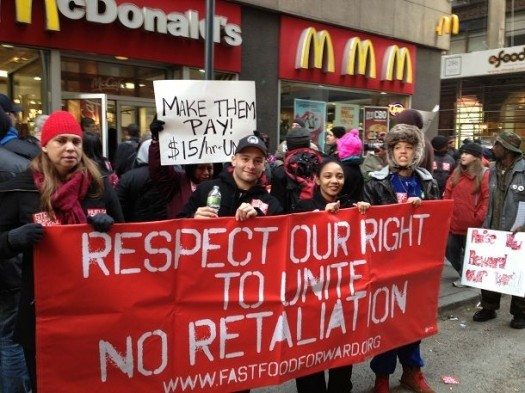Labor & Economy
Slow Progress for Fast-Food Workers

Labor Day may be over, but if the recent strikes in 60 cities are any indication, fast food workers intend to keep turning up the heat on a vast American industry built around poverty wages. For the first time, this mega-sector that grosses $200 billion a year is under serious scrutiny, as increasingly emboldened employees across the country demand a living wage from immensely profitable corporations sensitive to their public image.
While the focus on fast food workers’ paltry wages is well deserved, there’s another issue that demands attention: the rampant violation of labor laws by fast food giants.
It’s bad enough that 83 percent of workers in this industry earn less than $10.10 an hour — the average fast food cook, for example, makes $9.02 an hour or $18,760 a year — while typically being denied health insurance and other benefits. Adding injury to insult is the fact that fast food chains routinely break a wide range of laws meant to protect these workers.
Among the most common violations is wage theft, a term used to describe practices that deprive employees of wages to which they are legally entitled. Across all industries, American workers lose an estimated $30 billion a year to wage theft.
This spring, the activist group Fast Food Forward released a startling report documenting widespread wage theft in New York City’s fast food industry. According to that study, 84 percent of fast food workers in New York City reported some form of wage theft, including unpaid overtime, failure to provide mandated rest breaks, improper paycheck deductions and late or bounced paychecks. The report prompted the City Council to hold hearings on the matter and New York State Attorney General to launch an investigation.
On the opposite coast, meanwhile, Taco Bell Corp. is defending itself against class-action suits alleging violations of California labor laws, including “unpaid overtime, failure to pay wages on termination, failure to pay accrued vacation wages and failure to pay minimum wage.”
Fast food workers are also vulnerable to a practice all too common in the U.S.: retaliation. The weakness of American labor law allows employers to engage in aggressive efforts to discourage workers from organizing for better conditions or union representation. Prior to last fall’s strikes by fast food workers, the Fast Food Workers Committee filed multiple charges with the National Labor Relations Board against fast food companies alleging a variety of forms of illegal union busting. In response, community supporters have volunteered to escort fast food workers back to their place of employment following strikes, a tactic that has proven successful.
Another issue that fast food workers contend with is safety. In July, the perils faced by these workers took front and center when workers at a Manhattan McDonald’s and a Chicago Dunkin Donuts went on strike to protest what they alleged were excessive, dangerous heat levels. Studies of the restaurant industry, including fast food operations, have found systemic safety risks. For example, a 2011 report by the Restaurant Opportunities Center found that in Los Angeles, 42 percent of restaurant workers had been burned on the job and an equal percentage had been cut, while nearly 30 percent reported doing something that had put their own safety at risk.
Holding fast food corporations accountable is challenging, not least because courts often rule that franchisors are not liable for the actions of their licensed stores. Shifting responsibility to the individual franchises is nothing less than a “scam,” according to labor historian Nelson Lichtenstein, but it can be very effective.
Nevertheless, as fast food workers intensify their efforts to improve conditions, allegations of labor law violations will likely play an increasing role. After all, knowing that your favorite burger joint not only pays lousy wages but also breaks the law can leave a bad taste in your mouth.
(Julie Gutman Dickinson is partner in the union-side law firm Bush, Gottlieb, Singer, Lopez, Kohanski, Adelstein & Dickinson. She also serves on the Advisory Board of the Los Angeles Alliance for a New Economy. Her post first appeared on Huffington Post and is republished with permission.)

-

 The SlickJanuary 27, 2026
The SlickJanuary 27, 2026The One Big Beautiful Prediction: The Energy Transition Is Still Alive
-

 Column - State of InequalityJanuary 29, 2026
Column - State of InequalityJanuary 29, 2026Are California’s Billionaires Crying Wolf?
-

 Latest NewsFebruary 3, 2026
Latest NewsFebruary 3, 2026Amid the Violent Minnesota Raids, ICE Arrests Over 100 Refugees, Ships Many to Texas
-

 Dirty MoneyJanuary 30, 2026
Dirty MoneyJanuary 30, 2026Amid Climate Crisis, Insurers’ Increased Use of AI Raises Concern For Policyholders
-

 Featured VideoFebruary 4, 2026
Featured VideoFebruary 4, 2026Protesters Turn to Economic Disruption to Fight ICE
-

 The SlickFebruary 2, 2026
The SlickFebruary 2, 2026Colorado May Ask Big Oil to Leave Millions of Dollars in the Ground
-

 Column - State of InequalityFebruary 5, 2026
Column - State of InequalityFebruary 5, 2026Lawsuits Push Back on Trump’s Attack on Child Care
-

 Column - California UncoveredFebruary 6, 2026
Column - California UncoveredFebruary 6, 2026What It’s Like On the Front Line as Health Care Cuts Start to Hit

